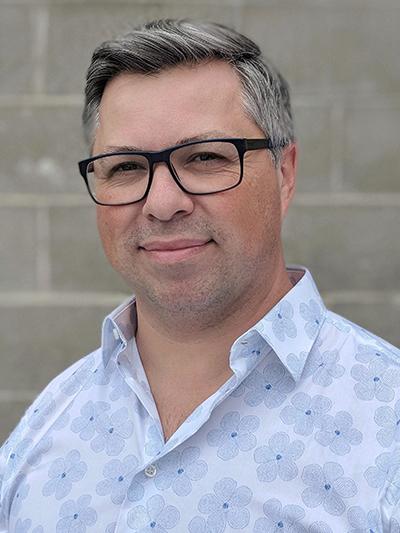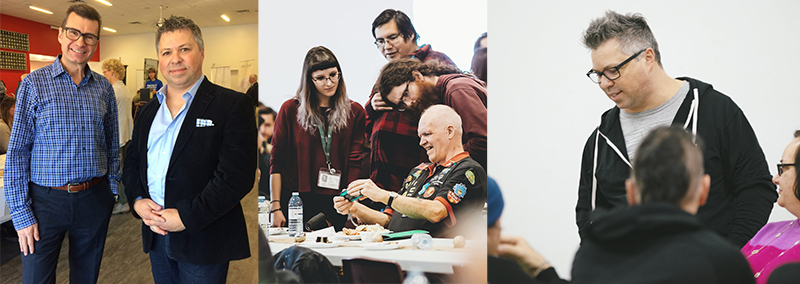Engel sees path to change in unconditional acceptance

By Dan Fagan
University Communications
publicinformation@minotstateu.edu
WINNIPEG, Canada – Barkley Engel embraces the idea that all people have the capacity and the right to change regardless of what they’ve done or what’s happened to them.
It was from this simple yet profound notion that Engel started Turning Leaf Services, a company dedicated to helping marginalized and vulnerable individuals overcome their struggles and transform their lives for the better. Whether working with individuals escaping situations of abuse, or patients overcoming addiction, to those who are at conflict with the law and seeking help, the staff at Turning Leaf is there to help.
Engel started Turning Leaf in 2005 in the modest digs of his own basement.
“It was pretty sad, honestly,” Engel admitted with a chuckle, “but it was a good place to start.”
Today, Turning Leaf offers multiple service locations and provides care for over 400 patients in the two provinces of Manitoba and Saskatchewan and the territory of Nunavut.
While Turning Leaf started in Engel’s basement, he is quick to point out that the origins go back even further to his undergraduate years at Minot State University.
Engel initially attended Minot State on a music scholarship but eventually changed course after being bitten by the sociology bug.
“I walked into my first sociology class and the professor was sitting cross-legged on the desk, which I thought was fascinating, and when we just started talking about the world and how it translated to human behavior on the interpersonal level,” Engel recalled.
It was at this point that Engel discovered that he had the mind of a sociologist.
“Being around people who thought in such an analytical way, trying to understand why people behave in the ways that they do, that was the turning point,” Engel said.
It was also during his time at Minot State that another pivotal moment occurred.
“I was diagnosed with a significant mental illness problem and I struggled with that quietly throughout the last couple of years during my time at Minot State,” Engel said. “I was one of those people who fell through the cracks.”
Fortunately, Engel was able to get the help that he needed.
Upon graduating from Minot State, Engel adhered to the advice of his Minot State professors and mentors, Harry Hoffman and Jim Thompson, and attended graduate school at the University of Manitoba, and later the Interfaith Marriage and Family Therapy Institute.
“I went from being an analyst of social behavior to someone who could engage in the therapeutic process,” Engel said. “It’s a bit of a winding path but I had a very strong foundation at Minot State and if it wasn’t for those relationships I probably never would’ve had the courage to go on and study at the graduate level.”

After graduate school, Engel embarked on his clinical journey working extensively with patients from all walks of life.
But it was while working with dual diagnosis sex offenders, individuals who have a mental illness as well as some other form of cognitive challenge, that Engel discovered people were going in and out of the hospital — and in and out of jail — and not getting the treatment that would keep them safe, healthy and connected to family.
“Ultimately these were people who kept falling through the gaps,” Engel said. “There was something missing in the relationship between the helper and the person being helped. Knowing that, and seeing that, I felt like I could do something different.”
Drawing on his education and work experience, Engel built a model called “turning leaf,” based on a set of values that he believes should be present in any healing relationship whether it’s in therapy, on the street, or in a jail.
The idea of turning leaf stems from Engel’s belief that everyone has the right and capacity to engage in a process of change. Engel and his staff at Turning Leaf share an approach to healing and a set of values that Engel believes are fundamental to helping bring about change.
“Everyone who works here has to have unconditional acceptance which means no matter what’s happened to you or what you’ve done we’ll accept you no matter what,” Engel said. “The idea of unconditional acceptance is powerful to me even to this day because everyone has moments when they wish someone had said that to them.”
In addition to unconditional acceptance, Engel sees empathy and compassion as two other crucial components to being a part of the Turning Leaf team.
“Ultimately, we’re working with a lot of people that are hurting,” Engel said, “and going to work isn’t always filled with those success stories that people like to hear, but the best part for me is that I am surrounded by a team of people that believe the same way I do, that have the same values, and that are dedicated to helping vulnerable and marginalized people have a better life.”
While not every day may seem like a success story, the expansion of Turning Leaf and the people that it has helped, speaks volumes to its effectiveness. Regardless, Engel is not one for patting himself on the back.
“The reality is we never could’ve gotten to this point without a team effort,” Engel said. “I’m just honored that people want to walk this path with me. It’s a long way from someone who struggles severely with a mental illness to someone who’s surrounded by hundreds of people who want to do the same work.”

About Minot State University
Minot State University is a public university dedicated to excellence in education, scholarship, and community engagement achieved through
rigorous academic experiences, active learning environments, commitment to public service, and a vibrant campus life.
Published: 07/02/20




